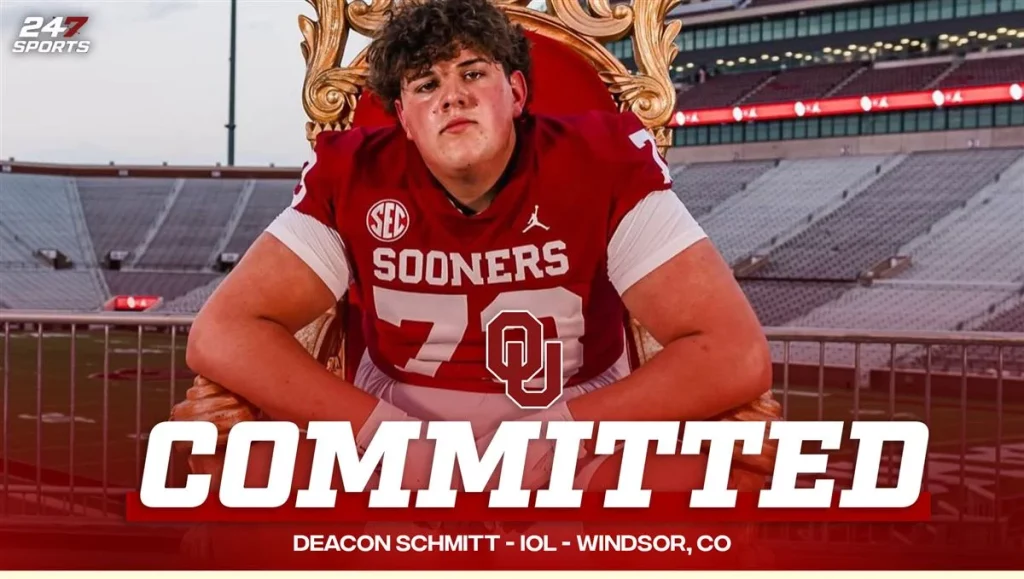
When Deacon Schmitt of Windsor commits to Oklahoma football, he taps “Horns Down.” This simple gesture, loaded with meaning, captures a moment of cultural significance and rivalry intensity that defines not only his personal journey but also the broader landscape of college football passion and tradition.
Deacon Schmitt, a rising star from Windsor, Colorado, has been on the radar of many major college football programs for quite some time. His commitment to the University of Oklahoma is not just another recruit choosing a team; it symbolizes a calculated decision that carries weight in the competitive world of college football recruiting. What makes his commitment resonate beyond just the signing itself is the iconic gesture he chose to make — the “Horns Down” sign, a notorious emblem of rivalry and defiance, particularly against the Texas Longhorns.
To understand the significance of Schmitt’s choice, one must first appreciate the cultural and historical context surrounding college football rivalries. The University of Oklahoma Sooners and the University of Texas Longhorns share one of the most storied rivalries in American sports, known colloquially as the “Red River Rivalry.” Every year, this matchup draws millions of viewers and sparks intense emotions from players, coaches, and fans alike. The rivalry is a mix of tradition, state pride, and competitive fire that runs deep in both fan bases. For Oklahoma fans, the Texas Longhorns represent their most bitter adversary, and vice versa.
The “Horns Down” gesture originated as a response to the University of Texas’s iconic “Hook ’em Horns” hand sign, where the index and pinky fingers are extended to mimic a longhorn steer’s horns. When Oklahoma fans flip that sign, it’s a clear sign of rivalry disrespect and a statement of intent. It’s a way to say, “We reject you. We are dominant here.” For a young player like Deacon Schmitt to embrace and display this gesture publicly upon committing to Oklahoma sends a powerful message — he is not only joining a team but immersing himself in the identity and ethos of the program, which thrives on challenging and ultimately defeating its greatest rival.
Schmitt’s journey to this moment was marked by hard work, determination, and significant attention from multiple college programs. As a standout athlete in high school, he had numerous offers and interest from some of the top football schools in the nation. His choice to commit to Oklahoma was influenced by several factors: the program’s rich football tradition, the coaching staff’s vision for his development, and the opportunity to compete at the highest level. But beyond these practical considerations, Schmitt’s embrace of the “Horns Down” gesture reveals a deeper layer of alignment with the culture of Oklahoma football — a culture that celebrates rivalry, resilience, and relentless pursuit of excellence.
The impact of Schmitt’s commitment and symbolic gesture is felt not only on the field but also across social media and fan communities. When recruits make their decisions public, especially with a bold move like tapping “Horns Down,” it energizes the fan base and rekindles the rivalry narrative. For Oklahoma supporters, it’s a validation of their program’s ability to attract top talent who are not just athletes but also passionate advocates of the team’s spirit. For Texas fans, it’s a rallying point, a challenge that reignites their own fervor to defend their legacy.
What’s fascinating about the “Horns Down” sign is how it transcends mere rivalry taunting and becomes a symbol of identity. For Schmitt and his peers, adopting this sign means stepping into a larger tradition. It’s a form of belonging, a badge of honor that ties them to generations of players who have battled fiercely on the gridiron. It also serves as a constant reminder of the stakes involved whenever Oklahoma takes on Texas — it’s not just a game, it’s a battle for pride, respect, and bragging rights.
In the broader context of college football recruiting, moments like Schmitt’s commitment show how much the culture and narrative of a program influence recruits. While facilities, coaching, and playing time are critical factors, recruits often look for programs where they can connect with the identity and ethos on a personal level. Schmitt’s choice and the accompanying gesture illustrate how recruits today are savvy and intentional about aligning themselves with programs that reflect their values and ambitions.
Moreover, this moment underscores the power of symbolic gestures in sports. Fans and players alike thrive on symbolism — be it through hand signs, chants, or traditions that convey deeper meaning. The “Horns Down” sign is one such symbol that carries the weight of history and emotion. When Schmitt chose to tap “Horns Down” upon his commitment announcement, he was not just signaling allegiance to a team; he was signaling readiness to embrace the challenges ahead, including the storied rivalry with Texas.
From a psychological perspective, Schmitt’s public embrace of “Horns Down” could be seen as a form of confidence and mental toughness. In high-level sports, mindset is everything, and by openly adopting a symbol that mocks the rival, he projects a sense of fearlessness and competitiveness. This can also serve to boost his own morale and that of his teammates, fostering a collective identity centered on overcoming adversaries.
The story of Deacon Schmitt’s commitment to Oklahoma football also highlights the evolving landscape of college athletics recruiting, where social media and public announcements play a significant role. In today’s digital age, a recruit’s commitment is not just a private decision but a public event. Gestures like tapping “Horns Down” are instantly broadcast and dissected by fans, analysts, and rival programs, adding layers of drama and excitement. This dynamic adds pressure but also creates moments that become part of the sport’s folklore.
Furthermore, Schmitt’s decision reflects the importance of rivalries in shaping college football’s unique culture. While professional sports often emphasize business and contracts, college football thrives on tradition, regional pride, and longstanding rivalries that fuel passionate competition. The “Horns Down” gesture is a perfect example of how rivalries manifest in tangible ways, influencing player identities and fan engagement.
As Deacon Schmitt begins his journey with Oklahoma football, the “Horns Down” moment will likely be remembered as a defining introduction to the program. It sets the tone for his career, signaling that he is not just a player but a participant in a legacy. Fans will watch eagerly to see how he performs on the field, especially in those high-stakes games against Texas, where the rivalry’s intensity is at its peak.
Ultimately, the commitment of Deacon Schmitt to Oklahoma football and his tapping of the “Horns Down” sign is a compelling snapshot of the intersection between sport, culture, and identity. It shows how a simple gesture can carry profound meaning, encapsulating the emotions, history, and competitive spirit that make college football so captivating. For Schmitt, this is more than just a hand sign — it’s a declaration of loyalty, a symbol of rivalry, and an entry point into a community bound by shared passion and tradition.
This moment reminds us that college football is about more than just the plays on the field; it’s about the stories, symbols, and rituals that connect players and fans across generations. Deacon Schmitt’s tapping “Horns Down” is a powerful affirmation of that truth — a young athlete claiming his place in a proud tradition, ready to face whatever challenges come with the crimson and cream of Oklahoma. As the seasons unfold, his journey will undoubtedly add new chapters to the rich narrative of this storied rivalry, fueled by the same spirit encapsulated in that iconic gesture.





